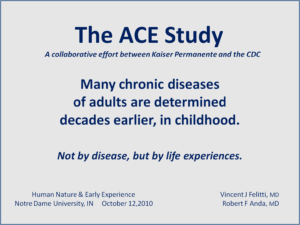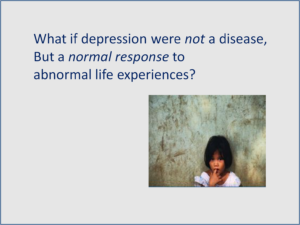The Adverse Childhood Experiences (ACE) Study is one of the largest investigations ever conducted to assess associations between childhood maltreatment and later-life health and well-being. The study is an ongoing collaboration between the Centers for Disease Control and Prevention (CDC) and the Kaiser Permanente’s Health Appraisal Clinic in San Diego.
The findings suggest that certain childhood experiences are major risk factors for the leading causes of illness and death as well as poor quality of life in the United States.
It is becoming alarmingly clear that both physiological and psychological health and disease, whether we thrive or remain stuck in life and even our search for purpose, meaning, and spiritual quests, has more to do with our early childhood environment (including intergenerational toxic stress) and its effects on the brain than anyone could imagine.
The study’s researchers came up with an ACE Score to explain a person’s risk for chronic diseases.
An important groundbreaking film, called, “Resilience: The Biology of Stress and the Science of Hope” describes the effects of these early childhood experiences.
The exciting news is that finally, after all these years, the impact of Adverse Childhood Experiences on health and disease is making its way into our collective consciousness and is starting to generate the interest and attention that it deserves.
We find all of this extremely encouraging! We intend to continue doing our part to bring awareness to this critical piece of the healing puzzle and advocate for the inclusion of addressing and healing Adverse Childhood Experiences, Stress and Trauma in all of our healing practices.
What is the ACE Study?
The ACE Study (Adverse Childhood Experiences) findings suggest that certain childhood experiences are major risk factors for the leading causes of illness and death as well as poor quality of life in the United States.
 When children are overloaded with stress hormones, they’re in flight, fright or freeze mode. They can’t learn in school. They often have difficulty trusting adults or developing healthy relationships with peers (i.e., they become loners).
When children are overloaded with stress hormones, they’re in flight, fright or freeze mode. They can’t learn in school. They often have difficulty trusting adults or developing healthy relationships with peers (i.e., they become loners).
To relieve their anxiety, depression, guilt, shame, and/or inability to focus, they turn to easily available biochemical solutions – nicotine, alcohol, marijuana, methamphetamine – or activities in which they can escape their problems – high-risk sports, proliferation of sex partners, and work/over-achievement. (e.g. Nicotine reduces anger, increases focus and relieves depression. Alcohol relieves stress.)
Using drugs or overeating or engaging in risky behavior leads to consequences as a direct result of this behavior.
For example, smoking can lead to COPD (chronic obstructive pulmonary disease) or lung cancer. Overeating can lead to obesity and diabetes.
In addition, there is increasing research that shows that severe and chronic stress leads to bodily systems producing an inflammatory response that leads to disease
By the way, lest you think that the ACE Study was yet another involving inner-city poor people of color, take note: The study’s participants were 17,000 mostly white, middle and upper-middle class college-educated San Diegans with good jobs and great health care – they all belonged to the Kaiser Permanente health maintenance organization.
How Can Unified Therapy™ Help?
 Unified Therapy™ can help unlock these traumatic and stressful experiences out of the body, brain, and nervous system where most of these experiences are stored and buried.
Unified Therapy™ can help unlock these traumatic and stressful experiences out of the body, brain, and nervous system where most of these experiences are stored and buried.
Rather than using biochemical solutions or engaging in patterns of high-risk behavior to temporarily escape problems, we all have an amazing built-in, biological healing reflex that once engaged, has the potential to take stress and trauma out of the body and promote healing of many health conditions such as trauma, anxiety, and chronic pain syndromes.
Amazingly, the systemic changes that are experienced on the inside can also be documented on the outside on film and internally measured with scientific equipment as well.
Find Your ACE Score
The ACE Study uses the ACE Score which is used to assess the total amount of stress during childhood and has demonstrated that as your ACE Score increases, so does the risk of disease, social and emotional problems.
Take your ACE Score Questionnaire here. You get one point for each type of trauma. The higher your ACE score, the higher your risk of health and social problems.
Did you know statistics show a score of 4 or more on the ACE Score highly increases your susceptibility to disease including:
- Anxiety
- Depression
- Many Autoimmune Diseases
- High Blood Pressure
- Diabetes
- Alcoholism and Alcohol Abuse
- Illicit Drug Use
- Liver Disease
- Ischemic Heart Disease (IHD)
- Chronic Obstructive Pulmonary Disease (COPD)
- Early Initiation of Smoking
- Early Initiation of Sexual Activity
- Multiple Sexual Partners
- Adolescent Pregnancy
- Unintended Pregnancies
- Risk for Intimate Partner Violence
- Sexually Transmitted Diseases (STDs)
- Suicide Attempts
Of course, other types of traumas exist that could contribute to an ACE score, so it is conceivable that people could have ACE scores higher than 10; however, the ACE Study measured only 10 types.
Now – What Does Your ACE Score Mean? During your initial consult and session at Evolutionary Healing Institute, your therapist will review your ACE Score along with your history and other questionnaires to determine the course of your sessions. Unified Therapy™ sessions are highly individualized based on the needs of the patient.
Resources
CDC – Adverse Childhood Experiences (ACE) Study
Preventing Adverse Childhood Experiences

